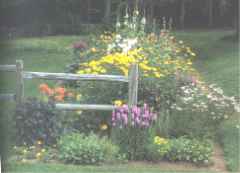 Planning
For Your Grand Garden Scheme
Planning
For Your Grand Garden Scheme
 Planning
For Your Grand Garden Scheme
Planning
For Your Grand Garden Scheme
In 1992, three Roxbury employees elected to take the Virginia Master Gardener course, myself being one of the three. We had been involved with the "green goods" industry for about 7 years. Previously, we had simply sold poultry and livestock feed, vegetable seed, fertilizer, and related farm products. This esthetics stuff was kind of new to us. Did you know it takes 17 grams (about 3/4 of an ounce) of protein to produce a chicken egg? Probably never sat around the old breakfast table thinking about that one.
Our motives in taking the course were purely business. The "Master Gardeners" textbook was identical to the study guide for the test to become a "Virginia Certified Nurseryman." We paid extra so we wouldn't have to do 50 hours of community education as a Master Gardener.
Years down the line, I have made many friends as a Master Gardener and experienced many joys including working with hundreds of school children. We a parent called me at home to tell me that their 5th grader had corrected them on their planting methods, I felt I had made an impact. I have since been honored with the opportunity to teach many Master Gardener classes.
Now to this week's column...One of our area's finest designers taught the Landscape Design module of our Master Gardener course. There are 16 modules from Botany to Water Gardens, and everything in between.
This designer had two primary principles. The first was to think of your garden as "rooms" of your house. Gardening is an extension of your home into the outdoors. The second was to consider the seasons as you planned your garden.
In considering the seasons, we were told to plan in reverse. Start with what you would have in the winter, then the fall, next the summer, and finally the spring. This approach will give year round interest. Winter usually involves evergreens, since not much flowers in the cold and short days. The fall has its stars that would encompass plants that have spent the entire growing season preparing for their splendor. The summer involves plants that love hot weather. The spring is for the "early risers" - kind of like James Dean. Live fast, die young!
The entire point of
this column is that it is mighty easy to walk into a garden center in April
and fill your garden with blooming plant material. This type of spontaneity
gives you two months of pleasure and 10 months of boredom. Plan before
you plant for greater gardening pleasure. Until next week.
Andy Lynn